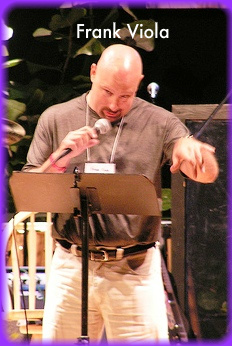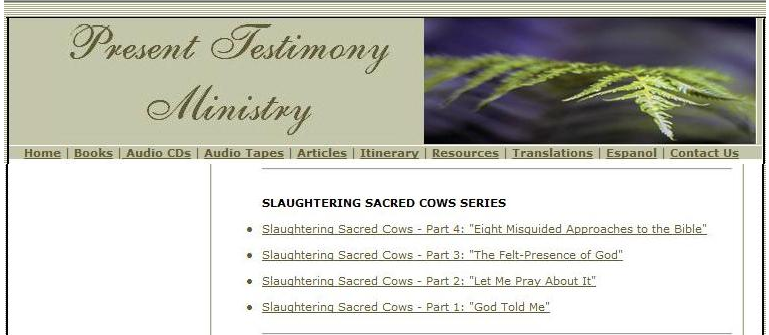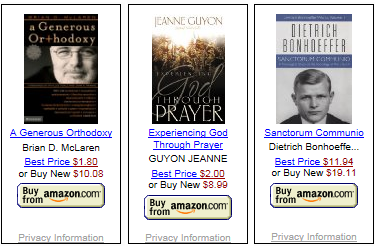CONTEMPLATIVE SPIRITUALITY AND RECOMMENDED READING FROM FRANK VIOLA
By Ken Silva pastor-teacher on Aug 30, 2011 in Current Issues, Emergence Christianity, Emergent Church, Features
 Syncretism slithers deeper into spiritually spineless evanjellyfish every day and Apprising Ministries continues to point it out for you wherever we find it.
Syncretism slithers deeper into spiritually spineless evanjellyfish every day and Apprising Ministries continues to point it out for you wherever we find it.
Dominionism is fast becoming a hot topic and it’s tied to the idea of “changing the world” and supposedly bringing ” God’s dream for the world” to fruition.
The key is to not get caught up in the fact that this idea is actually taught in different ways. The point is the same: In some fashion, man will bring about the Kingdom of God on earth.
With this in mind, in Leonard Sweet, Frank Viola, And The Third Way I pointed out that with the book Jesus Manifesto (JM) by Frank Viola and early Emergent Church theologian Leonard Sweet we see more confluence of House Church and the Emerging Church.
Let me bring to your attention a post over at Truthspeaker’s Weblog called Frank Viola joins with Emergent Church’s Leonard Sweet in writing new book.
It in turn first points us to a June 2010 Herescope post called The Other Side of Emergent: The New Apostolic Reformation, which now becomes even more important with the NAR in the news as it slithers into the broader Christian Right. We’re told:
Today is the launching of a new book, co-authored by Leonard Sweet and Frank Viola. This marks the open marriage of the Emergent movement with the New Apostolic Reformation (NAR).
Sweet and Viola’s book, Jesus Manifesto, is subtitled “Restoring the Supremacy and Sovereignty of Jesus Christ,” and it pushes the envelope on redefining Jesus, including “You can be a Jesus Manifest.”[2] A quick glance at the lineup of key endorsers for this book includes a list of who’s who in Emergent, the Latter Rain cult, neoevangelicalism and the New Apostolic Reformation. (Online source)
The writer of the aforementioned post at Truthspeaker’s then goes on to say:
Frank is now doing and promoting contemplative prayer his theology is completely corrupted. (Reported here on this blog) (Online source)
Not wanting to simply take the word of this one writer, I also found the “April 2006″ newletter from Viola republished here, and I’ve then discovered that it had also appeared on Viola’s own website in the Slaughtering Sacred Cows Series:
The last two links above have been blocked, but not this one, which I’ve saved offline to have on file: Slaughtering Sacred Cows: Part 3 “The Felt-Presence of God”. We learn, among other things, that Viola considers what’s come to be known as “the Toronto Blessing” a “new move of God.”
This becomes quite obvious when he tells us:
Upon hearing about the new move of God in March 1993, I traveled to Lakeland and sat in on those first meetings where “the blessing” had just begun. In January 1996, I traveled to Melbourne, Florida and sat in a meeting officiated by Randy Clark when the phenomenon had spread there in full force.
I will not share my observations of “the blessing” in this article. But I’m glad I went to those meetings. Ever since I’ve been a Christian, I’ve had an insatiable hunger to know my Lord more deeply. Consequently, if I hear a report that God is uniquely at work in a given place, I will move heaven and earth to visit it. This is what prompted me to check out those early meetings in Lakeland and Melbourne. (Online source)
For our purposes here, I bring to your attention that Viola goes on to talk about one of his “closest friends” who’s “a man named Frank Valdez.” Viola continues:
I met Frank in 1992. He is the wisest Christian I’ve ever met. He is also the most knowledgeable and spiritually insightful. (I have often told people, “If you don’t want to know the answer to your question, don’t ask Frank Valdez!”) Further, unlike many gifted Christian men, Frank is completely honest, straight-forward, and has no trace of a manipulative or deceptive spirit. He is one of the most Christ-like men that I know.
In October 1994, as we were sharing lunch together, I told Frank about my observations on “the Toronto blessing.” This led into an invaluable discussion that marked a turning point in my life. Frank said to me, “There is a Christian tradition that practices a form of prayer that employs no words. It’s beyond speaking in tongues and deeper than the Toronto blessing.” (Online source)
Here we have Valdez introducing Viola, in “October 1994,” to the oxymoron of this alleged “wordless prayer”; which is simply another way mystics refer to the transcendental meditation-lite they also call Contemplative/Centering Prayer.
And the so-called “Christian tradition” from which this form of Eastern-style meditation lightly sprayed in Christian terms would be the apostate Roman Catholic Church i.e. no longer Christian.
We’ll now see from the below that Viola’s version of evangelical Christian spirituality actually jumped the track, to borrow a phrase from that great pop philosopher Don McLean, a long, long time ago:
Frank began to share with me about the contemplative prayer tradition. He spoke about centering prayer, lectio divina, and other ancient spiritual practices that were unfamiliar to me at the time. He also used a word that I wasn’t too keen on. I’ve since learned that this word has been historically used to honor people . . . and with equal rigor, it has been used to damn them. Frank introduced me to the Christian “mystics.”
Paranthetically, to offer some overly-simplistic definitions, contemplative prayer is a prayer of interior silence that is beyond words. Centering prayer is a silent gazing upon the Lord that employs the use of a “sacred word” like “Lord” or “Jesus” to center one’s attention upon Him [mantra meditation] when the mind begins to wander. Lectio Divina is a form of spiritual communion where the Scriptures are turned into prayer. (Online source)
I’m a former Roman Catholic whom, by His grace alone, through faith alone in finished work of Christ alone on the Cross, God delivered from the spiritual bondage of Roman Catholicism into the glorious liberty of the sons of God.
And I can tell you that this “contemplative prayer tradtion” flowered in the antibiblical monastic traditions of the Church of Rome. In Origin Of Contemplative/Centering Prayer you’ll see that the terms Contemplative, and Centering, Prayer are virtually synonymous.
Both refer to this extremely dangerous spiritual practice of meditation in an altered state of consciousness. Now Frank Viola himself tells us below that he has indeed become a sinfully ecumenical mystic; and we’ll also know why he would find such a kindred spirit in Leonard Sweet.
They’re just two peas in a corrupt spiritual pod:
Frank gave me a brief history of the Christian “mystics,” as they came to be known. These were Christians who sought experiential union with their God. They had a fervent love for the Lord that had landed them into hot water. That love caused them to think and experiment “outside the box” of traditional religion. In their desperation to know the Lord intimately, some of them discovered ways of communing with God that went beyond petition-prayer, Bible-reading, and speaking in tongues.
In short, I was intrigued by what Frank shared with me that day. I then launched into a quest to read the writings that were part of this tradition. More importantly, I began to implement some of their discoveries into my own devotional life. As the years passed, I met others who were on this same journey. They too had gleaned from the same writings that had helped me so much.
I later discovered that there were some in this same tradition who are my contemporaries. Most of them, however, are outside the evangelical tradition. Rather, they are part of high church denominations like Catholic, Episcopal, and Anglican. Their writings have uncovered practical forms of spiritual communion that I’ve found to be of great profit personally. (Online source)
Indeed, they are outside; but I find myself wondering, does the Protestant Reformation still even ring an evangelical bell? That aside and closing this out, for now, let me draw your attention a tweet from Viola Saturday August 27:
The link takes us Viola’s posting on The Best 100 Christian Books Ever Written, where he tells us:
Just so we have this straight; the list in question comprises “core” books that Frank Viola regards as “exceptional” and they will “resonate most with those who have moved beyond evangelical.”
And of course we have the requisite disclaimer:
I don’t agree with every word of every book nor do I agree with everything the authors have ever said, done, or written elsewhere. (Online source)
Of course, rather conveniently, we don’t know what it is Viola may not agree with in these exceptional core books that make up his recommended list of the best Christian books ever written; e.g. such as:
See also:
FRANK VIOLA AND THE MERRY MONK
THE EMERGING CHURCH SOWING ITS NEO-ORTHODOX CONFUSION ON SCRIPTURE



